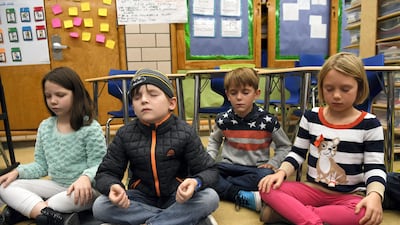As if being a parent weren’t tricky enough these days, there’s no shortage of experts around able to make it more confusing still.
From the perils of excessive smartphone use to the dire effects of a lack of exercise, the current generation of children seem beset by more threats to their well-being than ever before.
There’s a wealth of evidence out there to help cut through the claims and counterclaims. At least, that’s what scientific research is supposed to do. In reality, however, it has a habit of making things even more murky.
Take the current trend for teaching schoolkids the art of “mindfulness” as a means of relieving stress and anxiety.
An ancient practice used in all major religions, mindfulness broadly involves focusing attention on the here-and-now, and gently returning to it whenever — inevitably — the mind becomes distracted.
In these days of always-on, brain-frying gadgetry, it sounds like a life-skill everyone should acquire. And as The National reported last month it's increasingly being taught to children at schools in the UAE.
But just how effective is it — and could there be negative effects? After all, many of today’s most effective medical therapies have side-effects — so why not mindfulness?
Researchers have brought the cold light of science to bear on such questions, and at first sight it’s good news.
Since the 1990s, many studies have found evidence that mindfulness techniques can be beneficial in reducing stress, anxiety and depression, among many other conditions.
But while they appear to carry the imprimatur of rigorous science, there’s growing concern that the studies aren’t as reliable as they seem.
Last month the journal Perspectives on Psychological Science carried a major critique of the field by many leading researchers concerned about "the flow of misinformation" about mindfulness.
The researchers highlighted issues ranging from small study sizes and questionable experimental design to varied definitions of “mindfulness” even means, all of which threaten the reliability of research findings.
The researchers were not trying to dismiss the claims being made for the benefits of mindfulness, as these issues cut both ways. Studies that involve too few people can miss modest but worthwhile benefits, as well as modest but important side-effects.
And these do exist. Research has shown that mindfulness training can trigger feelings of agitation, confusion and — ironically — anxiety.
This is widely seen as a natural consequence of becoming aware of what random stuff is constantly flowing through our minds. As such, it’s arguably a key part of the mindfulness “journey”, but it can still be unpleasant.
And all this is comes just from research on adults. Simply assuming the findings also apply to children is clearly questionable.
Despite its growing popularity, only a handful of studies of the effectiveness of mindfulness with children have been published so far, and the results to date have been mixed.
In December, the outcome of a major new study examining the effectiveness of mindfulness with schoolchildren will be published by a team of researchers in Australia.
Unlike many studies, it’s relatively large — involving over 550 young adolescents at four schools, aged around 13 to 14. It’s also a so-called randomised controlled trial (RCT), with each student being randomly assigned either to receive the mindfulness training or not. This helps reduce the risk of the researchers getting biased results.
Those in the mindfulness group attended sessions given by a highly experienced practitioner once a week for two months. Around a third were also told to practice at home.
All of them were then given questionnaires to rate their levels of traits like depression and anxiety after the training period, and again six months and a year later.
The results, about to be published in the journal Behaviour Research and Therapy, are likely to spark controversy, as they show that the students who had been trained in mindfulness felt no better than those who hadn't.
Inevitably, this will be seized on by sceptics of mindfulness as proof it’s a waste of time. But that’s not how science works.
While the media — and many scientists — like to imbue huge significance into individual studies, in reality they are all just part of the emerging evidence for or against a claim.
As the researchers in the new study point out, there are several reasons why it could have failed to find any effect. For example, the students involved were relatively young compared to those in previous studies which had found benefits. It’s possible that mindfulness may demand a greater level of maturity before it becomes effective, say the researchers.
They also point out that relatively few of the students practised the technique at home.
Another possibility is that the study simply wasn’t big enough to detect a real benefit. Despite their best efforts, the researchers may just have been unlucky in the students who took part.
In short, what’s needed is not a snap judgement about the value of mindfulness lessons in schools, but more data from well-designed studies. That will take time to emerge, but it will be worth the wait.
The alternative is to let pundits and pressure-groups decide what we ought to think — and we should all be mindful of the dangers of doing that.
Robert Matthews is Visiting Professor of Science at Aston University, Birmingham, UK

